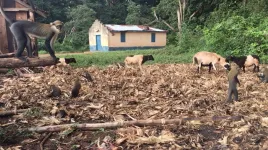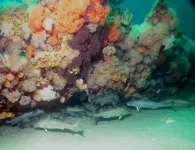(Press-News.org) SARS-CoV-2 showed the world with devastating clarity the threat undetected viruses can pose to global public health. SpillOver, a new web application developed by scientists at the University of California, Davis, and contributed to by experts from all over the world, ranks the risk of wildlife-to-human spillover for newly-discovered viruses.
SpillOver is the first open-source risk assessment tool that evaluates wildlife viruses to estimate their zoonotic spillover and pandemic potential. It effectively creates a watchlist of newly-discovered viruses to help policymakers and health scientists prioritize them for further characterization, surveillance, and risk-reducing interventions.
The tool is linked to a study published in the journal PNAS, in which the authors identified the most relevant viral, host and environmental risk factors for virus spillover. Then the team ranked the risk from 887 wildlife viruses using data collected from a variety of sources, including viruses detected by the USAID Emerging Pandemic Threats PREDICT project, which UC Davis' One Health Institute led from 2009 to 2020.
CORONAVIRUSES RANK HIGH
Topping the list were 12 known human pathogens, which was expected and validates the tool's utility. Interestingly, SpillOver ranked several newly-discovered coronaviruses as higher risk for spillover than some viruses already known to be zoonotic. This watchlist includes a novel coronavirus provisionally named PREDICT_CoV-35, which ranked within the top 20.
The power of the tool lies in the fact that it is open-source--the more data entered, the more robust the ranking. SARS CoV-2 currently ranks second out of the 887 viruses analyzed, between Lassa and Ebola viruses.
That may seem counterintuitive, the authors note, given the pandemic's current global devastation. They explain that the tool is ranking the potential for another spillover beyond what has happened historically. In addition, key information remains undiscovered about SARS CoV-2 and its spillover risk, such as the number and range of its host species. As scientists learn more about this virus, it is possible SARS CoV-2 will move to No. 1.
"SARS-CoV-2 is just one example of many thousands of viruses out there that have the potential to spillover from animals to humans," said lead author Zoë Grange, who led the development of SpillOver as a postdoctoral researcher with the UC Davis One Health Institute. "We need to not only identify but also prioritize viral threats with the greatest spillover risk before another devastating pandemic happens. Our SpillOver Viral Risk Ranking tool is the starting point for building proactive solutions."
VIRUS 'CREDIT SCORE'
SpillOver was inspired by risk assessments used by banks and insurance companies. It creates a "credit-like" score for viruses by looking at key risk factors and using them to prioritize those viruses posing the greatest potential threats to human health for a watchlist. Users can customize the watchlist to their own circumstances, such as country of interest.
Previous virus-ranking tools have been limited in the number or types of viruses analyzed, with minimal risk factors considered. SpillOver considers 32 risk factors about the virus and hosts, including associated environment and human behaviors. It also includes 25 different viral families, from coronaviruses to the viral family that causes ebolaviruses.
RANK YOUR VIRUS
SpillOver produces a detailed risk report for each virus, and its 'Risk Comparison' tool allows users to compare and contrast ranked viruses, as well as filter viruses on a selection of key attributes, including virus species, host species and country of detection.
As an open-source tool, SpillOver provides a living platform for ongoing ranking of spillover risk. Scientists can contribute data to existing viruses or assess risk of new viruses using the 'Rank Your Virus' application.
"This tool is intended to start a global conversation that will allow us to go far beyond how we thought about ranking viruses in the past and allow real-time scientific collaboration to identify new threats early," said corresponding author Jonna Mazet, a professor at the UC Davis School of Veterinary Medicine, founding director of the One Health Institute and former global director of PREDICT. "SpillOver can help advance our understanding of viral health threats and enable us to act to reduce the risk of spillover before pandemics can catch fire."
SpillOver engages and enables scientists who are discovering viruses to collaborate in a One Health framework that is focused not only on viral characteristics but also on all of the circumstances present at high-risk areas for disease emergence. This allows the tool to be a catalyst for rapidly identifying and ranking newly-discovered viruses and their animal-human transmission interfaces.
This paradigm shift can facilitate collaboration early, across disciplinary and national boundaries. Identifying and ranking viruses for human-health risks can help scientists identify critical control points and address human behaviors that put humans and animals at risk for novel viral infection.
INFORMATION:
The study's co-authors include hundreds of individuals who supported the PREDICT Project in their countries and home institutions, as well as global scientific leaders in viral emergence and the core collaborating institutions, including the Wildlife Conservation Society, EcoHealth Alliance, Metabiota, Smithsonian Conservation Biology Institute, Columbia University's Center for Infection and Immunity.
Funding support for the study was provided by the USAID Emerging Threats Project.
New Haven, Conn. -- In a new study, Yale Cancer Center researchers have defined the genetic landscape of uterine leiomyosarcomas (uLMS). Furthermore, using fully sequenced patient-derived xenografts, the team has preclinically validated new treatment modalities, which may point to new treatments for uterine cancer. Study results were published online in an early edition of the Proceedings of the National Academy of Science (PNAS).
Uterine cancer is the most common gynecologic malignancy and uterine leiomyosarcomas (uLMS) are highly lethal sarcomas arising from the myometrium, the smooth muscle layer of the uterus. They represent ...
Overfishing likely did not cause the Atlantic cod, an iconic species, to evolve genetically and mature earlier, according to a study led by Rutgers University and the University of Oslo - the first of its kind - with major implications for ocean conservation.
"Evolution has been used in part as an excuse for why cod and other species have not recovered from overfishing," said first author END ...
BOSTON - Men and women whose mothers experienced stressful events during pregnancy regulate stress differently in the brain 45 years later, results of a long-term study demonstrate.
In a unique sample of 40 men and 40 women followed from the womb into their mid-forties, the brain imaging study showed that exposure during fetal development to inflammation-promoting natural substances called cytokines, produced by mothers under negative stress, results in sex-associated differences in how the adult brain responds to negative stressful situations more than 45 years after ...
High levels of biodiversity in aquatic settings offers a wide range of vitamins, minerals, and fatty acids crucial for human health, a range of nutrients that are lacking in ecosystems where the number of species have been reduced by overfishing, pollution, or climate change, researchers report April 5 in the journal Proceedings of the National Academy of Sciences.
"What we found is that biodiversity is crucial to human health," said Yale's Joey Bernhardt, a G. Evelyn Hutchinson Postdoctoral Fellow in the Department of Ecology and Evolutionary Biology and co-author of the paper.
While humans can achieve their protein requirements even with seafood from less-diverse systems, ...
A growing body of evidence suggests that biodiversity loss increases our exposure to both new and established zoonotic pathogens. Restoring and protecting nature is essential to preventing future pandemics. So reports a new Proceedings of the National Academy of Sciences (PNAS) paper that synthesizes current understanding about how biodiversity affects human health and provides recommendations for future research to guide management.
Lead author Felicia Keesing is a professor at Bard College and a Visiting Scientist at Cary Institute of Ecosystem Studies. She explains, "There's a persistent myth ...
EAST LANSING, Mich. - Nine of the hottest years in human history have occurred in the past decade. Without a major shift in this climate trajectory, the future of life on Earth is in question, which poses a new question: Should humans, whose fossil fueled society is driving climate change, use technology to put the brakes on global warming?
Michigan State University community ecologist Phoebe Zarnetske is co-lead of the Climate Intervention Biology Working Group, a team of internationally recognized experts in climate science and ecology that is bringing science to bear on the question and consequences of geoengineering a cooler Earth.
The group's ...
BOSTON - Addiction is associated with social exclusion, loss of access to resources, and general disengagement from civic life. Now, a study recently published in the journal Psychology of Addictive Behaviors and led by David Eddie, PhD, of the Massachusetts General Hospital's Recovery Research Institute has found that the majority of Americans who have resolved an alcohol or other drug problem report achievements related to self-improvement, family engagement, and civic and economic participation since resolving their addiction. Additionally, it appears these achievements accumulate with time in addiction recovery.
Incorporating data from the Recovery Research Institute's landmark 2017 National Recovery Study, which indicated ...
A new study by Stanford University biologists finds an explanation for the idea that physical characteristics such as skin pigmentation are "only skin deep." Using genetic modeling, the team has found that when two populations with distinct traits combine over generations, traits of individuals within the resulting "admixed" population come to reveal very little about individuals' ancestry. Their findings were published March 27 in a special edition of the American Journal of Physical Anthropology on race and racism.
"When two founding groups first come together, a visible physical trait that differed between those founders initially carries information about the genetic ancestry of admixed individuals," says Jaehee Kim, a postdoctoral research fellow in biology at Stanford and first author ...
In the fight against cancers, activating mutations in the RAS family of genes stand in the way of finding viable treatment options. Now, scientists at the University of Missouri and Yale University have discovered that one of these mutations -- oncogenic RAS or RASV12 -- is also responsible for the regrowth of cancer cells following genotoxic therapy treatment, or drugs that cause damage to a cancer cell's DNA in order to eliminate it from the body.
"Most of our knowledge of how cells respond to DNA damage is mainly derived from studies looking at the single cell level," said Yves Chabu, an assistant professor in the MU College of Arts and Science. "Therefore, we don't know much about how tumor cells respond to DNA damage in the broader ...
URBANA, Ill. ¬- If your day started with a cup of coffee, there's a good chance your morning brew came from Colombia. Home to some of the finest Arabica beans, the country is the world's third largest coffee producer. Climate change poses new challenges to coffee production in Colombia, as it does to agricultural production anywhere in the world, but a new University of Illinois study shows effects vary widely depending on where the coffee beans grow.
"Colombia is a large country with a very distinct geography. The Andes Mountains cross the country from its southwest to northeast corner. Colombian coffee is currently growing in areas with different altitude levels, and climate impacts will likely be very different for low ...




